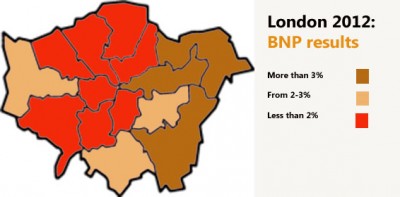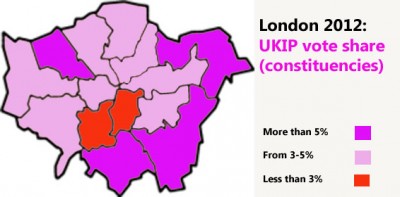While understandably most of the news focuses on the big winners and losers of the election here at Big Smoke we try to give you something that you’d be hard pressed to find anywhere else. So let’s take a look at the tiddlers that were swimming in the big electoral pond this time around – in this case those to the right of the Tories;
As expected the far right British National Party was wiped off the electoral map having gained its first toe hold in 2008.
The bizarre sight of the BNP running a South American candidate who had volunteered to fight in the Falklands War against Britain simply reinforced the idea that this was a joke candidacy from a party that had lost is steam.
I imagine Nick Griffin running after the voters, Fenton style, calling after them hopelessly as they charge into his political distance. This election was not about the far-right and it was healthy for democracy for the focus to be on what people wanted rather than voting for any candidate that isn’t fascist, which frankly is setting the bar pretty low.
Unlike in 2008 the parties and press gave the BNP zero oxygen and anti-fascist campaigning was low key, and this was right and proper. Only the Liberal Democrats made a half hearted attempt to raise the specter of the BNP (erroneously stating that voting Lib Dem was in some way the best way to keep the BNP out), and as such they were the only party who attempted to fuel the very reason that people vote for the far right, that the establishment are frightened of them.
Another pleasing development was the fact that the far right vote was disastrously split. While the BNP only got 2.12% of the list vote the total far right vote was 3.48%, still poor but in Havering and Redbridge, and Bexley and Bromley they received more than 5% of the vote taken together. This split cost them at least one constituency deposit. This a pleasing result and quite different from 2008 where there were some very significant votes for the far right.
We can see that the BNP’s highest votes came from the same areas that voted Conservative and their weakest areas were the Labour areas with the notable exception of City and East which contains the now abandoned stronghold of Barking and Dagenham where, while the vote collapsed to below half where they were still retains a core of voters willing to vote racist.
With 4.5% on the list UKIP improved their performance but didn’t quite reach the 5% cut off point to get them back onto the assembly.
The UK Independence Party chose to stand as “Fresh Choice for London” in the constituencies, in order that should they win a seat it would not cost them a place on the top-up list.
This choice to abandon the more recognisable name for a technical does not appear to have overly damaged the party as, on average, the list vote was higher than the constituency vote in each area.
In Bexley and Bromley, and Havering and Redbridge this effect was strongest (with a list vote 1.8% and 1.2% higher than the constituency candidate) although this was not always the case, in Brent and Harrow 1.8% increase for the constituency candidate. If there were voters who were confused by the name change they didn’t come in significant numbers.
It will come as no surprise that the most Conservative parts of outer London were more likely to vote UKIP while places like Brixton were not as receptive to their message. If we compare the UKIP vote to the BNP vote there is a correlation between where UKIP gained and where the BNP lost the most votes, although whether these are the same people moving from one to the other is simply a matter of speculation.
Overall 9.2% of those who voted in the Mayoral election gave UKIP either a first or second preference, but with less than 2% using their first preference in that direction they were in danger of being over taken by the much less popular (more unpopular?) BNP candidate so, if they want to get their Mayoral deposit back next time round they need to do more to persuade their own voters to first preference UKIP for Mayor.
One last note
I was disappointed to see that in Havering and Redbridge the Residents’ Association candidate achieved more than 5% of the constituency vote. Having run a right-wing immigration and policing campaign (who I guess aren’t residents?) he did not appear to me to be the kind of person that would play a very useful role on the London Assembly.





0 Comments
You can be the first one to leave a comment.